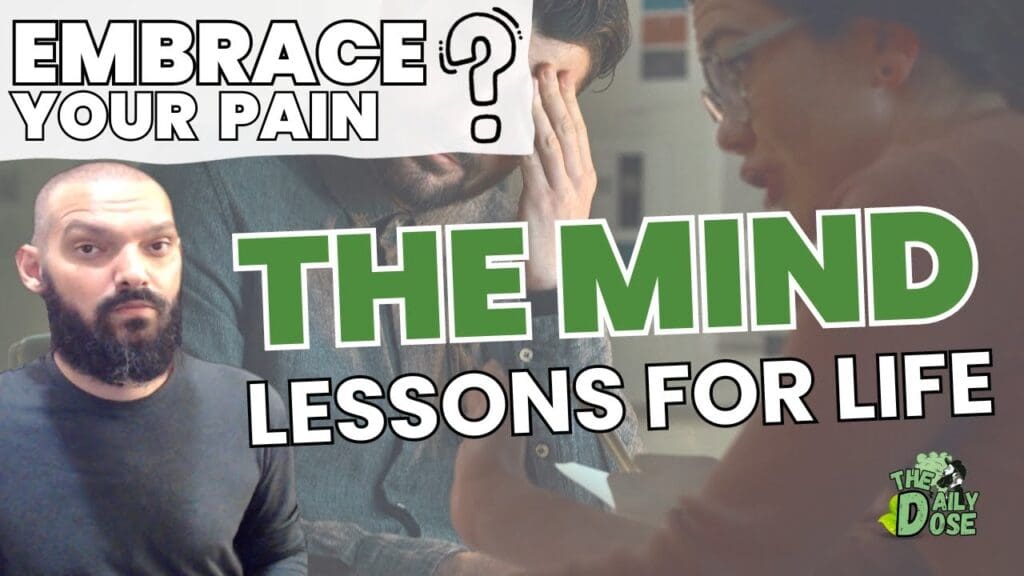Check out the full audio episode here The Daily Dose Podcast Audio
Power Of The Mind: What Needs To Be Understood Now
Table of contents
- Introduction
- The Human Mind: A Remarkable Engine of Potential
- Understanding the Ego
- The Connection Between Mind and Ego
- Ego-Related Accountability: A Positive Perspective
- The Power of Self-Reflection
- Overcoming Ego-Related Challenges
- Case Studies: Real-Life Applications
- Success Stories of Mind and Ego Empowerment
- Beyond the Individual: Collective Consciousness
- A Positive Conclusion
- FAQs
Introduction
In a world where self-improvement and personal development are at the forefront of our aspirations, understanding the profound interplay between the human mind and the ego has never been more critical. The mind and ego-related accountability is a dynamic force that shapes the course of our lives and influences our interactions with the world.
The Human Mind: A Remarkable Engine of Potential
Before we dive into the intricacies of ego-related accountability, it is crucial to comprehend the inherent power of the human mind. The human brain is a marvel of nature, with an astonishing capacity to adapt and evolve.
Cognitive neuroscience has demonstrated that the brain is not a static organ but rather a highly plastic and flexible one. It is constantly rewiring itself in response to our experiences and the stimuli we encounter.
The Subconscious Mind
At the heart of this astounding organ lies the subconscious mind, a reservoir of untapped potential that shapes our thoughts, beliefs, and behaviors. This part of the mind operates beneath the surface of our conscious awareness, influencing our decisions and actions without us even realizing it.
One might compare it to an iceberg, with only a small portion visible above the waterline, while the vast bulk remains hidden below.
Our subconscious mind is responsible for processing vast amounts of information every day, often working in conjunction with the conscious mind. It is here that our core beliefs, values, and memories reside, and it plays a fundamental role in shaping our perceptions of reality.
Recognizing and harnessing the power of the subconscious mind is a pivotal step in understanding how it contributes to our accountability.
Cognitive Neuroscience and Brain Plasticity
Cognitive neuroscience, a field at the intersection of psychology and neuroscience, has made great strides in unraveling the mysteries of the human brain. Research in this field has shown that the brain’s plasticity allows for continuous learning and adaptation throughout our lives.
This means that our cognitive abilities and emotional responses are not fixed but can be cultivated and improved with deliberate effort.
The brain’s plasticity provides us with the remarkable ability to learn new skills, overcome challenges, and adapt to changing circumstances. The idea that we can rewire our brains to become more accountable, resilient, and proactive is not only scientifically supported but also incredibly empowering.
Harnessing the Mind’s Power for Personal Growth
The understanding that our minds are not fixed but malleable offers us a profound opportunity for personal growth and self-improvement. By actively engaging with our subconscious mind and consciously shaping our thought patterns and beliefs, we can direct our lives towards a more accountable and fulfilling path.
In the sections that follow, we will explore the role of ego in this journey and how it interacts with the power of the mind. We will also delve into the positive aspects of the ego and ways to utilize them for personal development.
As we progress, remember that the human mind, with its innate plasticity, serves as the canvas upon which we can paint a brighter and more accountable future for ourselves.

Understanding the Ego
The concept of the ego has been a subject of fascination and debate for centuries. Philosophers, psychologists, and spiritual leaders have all sought to define and understand the ego’s role in shaping human behavior and consciousness. In the context of this review, we will explore the ego as the mental construct that defines our sense of self and how it influences accountability.
Defining Ego
The term “ego” is often used colloquially to describe a person’s sense of self-importance or arrogance. However, in psychological and philosophical terms, the ego is a more nuanced and complex concept. It is the part of the mind that manages our conscious awareness of self and serves as a mediator between our inner desires and the external world.
The Role of Ego in Our Lives
The ego plays a crucial role in our daily existence. It constructs our self-identity, maintains our self-esteem, and serves as a filter through which we perceive and interact with the world. It is the ego that differentiates “I” from “others” and guides our decisions based on our personal interests, desires, and values.
While the ego is integral to our sense of self and individuality, it can also be a source of inner conflict and resistance to change. It is, in part, responsible for self-preservation, which can lead to a reluctance to accept accountability for our actions. However, as we will discuss in later sections, the ego’s influence can be harnessed for positive outcomes.
Positive Aspects of Ego
It is essential to recognize that the ego is not inherently negative or detrimental. In fact, it serves several constructive purposes in our lives. The ego provides a sense of self-identity and individuality, fostering self-esteem and self-worth. It helps us establish personal boundaries, navigate social interactions, and set goals that align with our values and desires.
Moreover, the ego can be a source of motivation and determination. When harnessed appropriately, it can drive us to take responsibility for our actions and work towards self-improvement. The key lies in finding a balance between the ego’s protective instincts and its capacity to aid us in being more accountable.

The Connection Between Mind and Ego
Understanding the intricate connection between the human mind and the ego is paramount in our exploration of accountability. The mind and ego are not isolated entities but rather closely intertwined, with each influencing the other in a dance of consciousness.
The Interplay Between Conscious and Unconscious Mind
Our conscious and subconscious minds work in tandem to shape our experiences and decisions. While our conscious mind makes deliberate choices and decisions, our subconscious mind operates behind the scenes, often based on established patterns and beliefs.
The ego acts as a bridge between these two realms. It interprets the signals from the subconscious and presents them to our conscious awareness. For instance, if our subconscious mind harbors limiting beliefs about our abilities, our ego may manifest as self-doubt or fear in our conscious thoughts and actions.
Recognizing this interplay allows us to become more mindful of the thoughts and behaviors influenced by our subconscious mind and ego. With this awareness, we can take intentional steps to reprogram these automatic responses for greater accountability.
How Ego Shapes Our Thoughts and Actions
The ego exerts its influence in various ways, affecting our thoughts, emotions, and behaviors. It can create a sense of superiority or inferiority, depending on our self-concept. These self-concepts, in turn, influence our self-talk and the stories we tell ourselves about our capabilities and limitations.
For example, if someone has a well-developed ego that values accountability, they may view setbacks as opportunities for growth and learning. On the other hand, an ego driven by insecurity may interpret those same setbacks as personal failures, leading to avoidance of responsibility.
The Duality of the Ego-Mind Relationship
The relationship between the ego and the mind is multifaceted, characterized by both cooperation and tension. On one hand, the ego’s role is to protect our self-identity and maintain a sense of stability. On the other hand, the mind’s inherent plasticity and adaptability often clash with the ego’s resistance to change.
As we explore ego-related accountability, it is crucial to acknowledge this duality and navigate it with a positive perspective. Rather than seeing the ego as an impediment, we can learn to work with it, harnessing its protective instincts while steering it toward accountability and self-improvement.

Ego-Related Accountability: A Positive Perspective
Accountability is a cornerstone of personal growth and development. It involves taking responsibility for one’s actions, acknowledging mistakes, and actively working to rectify them. While the ego’s influence can sometimes hinder accountability, we can also leverage its power for positive outcomes.
Personal Responsibility and Ego
One of the primary challenges in achieving accountability is recognizing the need to take responsibility for our actions. The ego often resists admitting mistakes or shortcomings, as doing so may threaten our self-esteem and self-concept. However, embracing accountability is not a sign of weakness but a mark of strength and maturity.
Accountability is an empowering concept that puts the individual in control of their destiny. It allows us to acknowledge our role in the outcomes of our lives and provides a foundation for growth and self-improvement. By understanding the constructive potential of accountability, we can encourage the ego to align with this value.
Accountability as a Path to Self-Improvement
Accountability is not merely a mechanism for rectifying mistakes; it is a pathway to self-improvement and personal development. When we take responsibility for our actions, we create an opportunity for growth and change. It enables us to learn from our experiences, make better choices, and ultimately lead more fulfilling lives.
Cultivating Accountability for Positive Outcomes
To harness the power of ego-related accountability, we can employ a range of strategies and practices. Self-awareness is the first step; by recognizing how our ego influences our thoughts and actions, we can begin to modify its impact. Here are some practical steps to cultivate accountability:
| Self Reflection | Set Goals | Embrace Feedback | Develop Your Mind | Accountability A Way Of Life | Mindfulness |
|---|
- Self-Reflection: Regular self-reflection helps us become aware of our thoughts, emotions, and behaviors. It enables us to identify patterns where our ego may be hindering accountability.
- Setting Clear Goals: Establishing clear, achievable goals aligns our ego with our desires for self-improvement. When our ego recognizes the benefits of accountability, it becomes a powerful ally.
- Embracing Feedback: Feedback, whether positive or negative, is an invaluable tool for accountability. It allows us to see where our actions align with our intentions and where improvement is needed.
- Developing a Growth Mindset: Embracing a growth mindset means viewing challenges as opportunities for growth rather than threats to our ego. This shift in perspective can significantly enhance our accountability.
- Accountability Partners: Sharing your journey with someone who can hold you accountable can be immensely beneficial. This external support can counterbalance the ego’s resistance to self-awareness.
- Mindfulness and Meditation: Practices like mindfulness and meditation can help us become more aware of our ego-driven thoughts and emotions. They provide a calm space for objective self-observation.
By actively engaging with these strategies and techniques, individuals can channel the power of their mind and ego toward greater accountability. Overcoming ego-related challenges is a journey, but one filled with rewards and personal growth.

The Power of Self-Reflection
Self-reflection is a cornerstone of personal development, and it plays a crucial role in fostering accountability. This process involves examining one’s thoughts, emotions, and actions with an open and non-judgmental perspective. Self-reflection allows us to gain insight into our behavior and identify areas for improvement.
Self-Reflection Techniques
There are several effective techniques for self-reflection, each serving a unique purpose in the journey toward greater accountability:
| Journal | Meditate | Reflect | Feedback | Analyze |
|---|
- Journaling: Maintaining a journal is a powerful tool for self-reflection. It provides a structured way to record thoughts and emotions, track progress, and identify patterns in behavior.
- Meditation: Meditation offers a quiet space for self-reflection. By focusing on the present moment and observing thoughts without judgment, individuals can gain a deeper understanding of their ego’s influence.
- Self-Questioning: Asking specific questions about your thoughts and actions can prompt self-reflection. Questions like “Why did I react that way?” or “What beliefs are driving my behavior?” encourage introspection.
- Feedback Seeking: Actively seeking feedback from others can provide valuable insights. It offers an external perspective on our actions, which can complement our internal self-reflection.
- Retrospective Analysis: Periodically reviewing past experiences and decisions can help us identify trends in our behavior. Recognizing repeated patterns allows us to take proactive steps toward accountability.
Transformative Effects of Self-Examination
Engaging in self-reflection has the power to transform our lives and enhance our accountability. By observing our thoughts, emotions, and behaviors, we become more aware of the ego’s role in shaping our actions. This awareness, in turn, enables us to make intentional choices that align with our values and goals.
Journaling, in particular, is a valuable tool in this process. When consistently maintained, a journal becomes a record of personal growth and self-discovery. It serves as a compass guiding us toward greater accountability and a more profound understanding of our inner selves.
In the sections that follow, we will explore strategies for overcoming ego-related challenges and showcase real-life case studies that highlight the positive impact of accountability on personal development and success. Our journey into the intricate relationship between the mind and ego continues, with a focus on embracing the positive aspects of this connection.

Overcoming Ego-Related Challenges
As we navigate the path of self-improvement and accountability, we inevitably encounter challenges stemming from the ego’s protective instincts. These challenges may manifest as resistance to change, a fear of vulnerability, or a reluctance to acknowledge mistakes. However, with the right strategies, these obstacles can be overcome.
Ego’s Resistance to Change
The ego is inherently resistant to change because it perceives any shift as a potential threat to its self-concept. This resistance can manifest in various ways, such as procrastination, denial, or avoidance of difficult situations. To overcome this resistance, we must recognize its existence and work with it rather than against it.
| Self Compassion | Negativity | Visualization | Affirmations | Embrace Vulnerability |
|---|
Strategies to Tame the Ego
- Self-Compassion: Cultivating self-compassion allows us to approach our ego with kindness and understanding. Instead of criticizing ourselves for ego-driven behaviors, we can acknowledge our humanity and imperfections.
- Reframing Negative Self-Talk: The ego often feeds us negative self-talk that hinders accountability. By consciously reframing these thoughts into more positive and constructive narratives, we can shift our mindset.
- Visualization: Visualizing our desired outcomes and the benefits of accountability can motivate the ego to align with our goals. Creating a vivid mental picture of success can counterbalance the ego’s fear of change.
- Affirmations: Affirmations are positive statements that reinforce desired behaviors and beliefs. By repeating affirmations that promote accountability, we can reprogram the ego’s resistance.
- Embracing Vulnerability: Acknowledging vulnerability and embracing it as a strength rather than a weakness is a powerful way to overcome ego-related challenges. Vulnerability fosters genuine self-awareness and connection with others.
The Importance of Humility
Humility is a virtue that plays a pivotal role in overcoming ego-related challenges. It involves recognizing our limitations, being open to learning, and acknowledging the contributions of others. Humility is not a sign of weakness but a mark of wisdom and self-assuredness.
By embracing humility, we can temper the ego’s resistance and open ourselves to personal growth. It allows us to view mistakes as opportunities for learning and accountability as a source of strength rather than a threat to our self-esteem.
In the upcoming sections, we will explore real-life case studies that exemplify the transformative power of mind and ego-related accountability. These stories serve as inspiring examples of individuals who have harnessed their ego’s potential for positive outcomes and personal development.

Case Studies: Real-Life Applications
Real-life case studies offer a compelling look at how individuals have harnessed the power of their minds and ego-related accountability for transformative change. These stories demonstrate the potential for personal growth and success when we actively engage with the interplay between the mind and ego.
Success Stories of Mind and Ego Empowerment
Case Study 1: Sarah’s Journey to Self-Awareness
Sarah, a successful entrepreneur, struggled with her ego’s need for control. She realized that this resistance to collaboration was holding her back from greater achievements. Through self-reflection and mindfulness practices, she recognized her ego-driven behaviors and began to embrace vulnerability. As she let go of her need for control, she found her business flourishing and her relationships strengthening.
Case Study 2: Mark’s Redemption through Accountability
Mark, a recovering addict, faced a critical moment in his life when he decided to take accountability for his actions. He had long blamed external circumstances for his addiction.
Through self-reflection and therapy, he realized that his ego’s self-protective mechanisms had kept him from acknowledging the root causes of his addiction. Once he embraced accountability, he began the journey to recovery and sobriety.
The Influence of Mind and Ego in Personal Development
These case studies illustrate how individuals can harness the power of their minds and ego-related accountability to transform their lives. Whether it’s overcoming a need for control or taking accountability for one’s actions, these stories exemplify the potential for positive change through self-awareness and self-improvement.
In the subsequent sections, we expand our focus to explore the broader impact of the mind and ego on collective consciousness and social accountability. The connection between individual growth and societal progress is a testament to the boundless potential of the human mind and ego.

Beyond the Individual: Collective Consciousness
As we navigate the intricacies of ego-related accountability, it is essential to recognize its influence on a larger scale. Our individual journeys toward personal growth and responsibility are interconnected with the collective consciousness of society. By embracing accountability and cultivating a positive perspective, we can contribute to meaningful change on a broader level.
Mindfulness and Social Change
Mindfulness, a practice rooted in self-awareness and presence, has gained prominence in recent years. It encourages individuals to be fully engaged in the present moment and observant of their thoughts and emotions. As more people embrace mindfulness, its ripple effects are felt at the societal level.
Mindful individuals are more likely to make ethical decisions and engage in responsible behavior. They exhibit greater empathy and compassion, which are essential elements of social change. By fostering mindfulness in ourselves and our communities, we can contribute to a more accountable and compassionate world.
Collaborative Efforts for a Better World
Accountability is not limited to individual responsibility; it extends to collective efforts for positive change. When individuals and organizations hold themselves accountable, they create a foundation of trust and integrity that benefits society as a whole.
Collaborative initiatives, such as social responsibility programs and environmental conservation efforts, are driven by the shared values of accountability and ethical behavior. When these values are embraced collectively, they can lead to significant advancements in areas such as environmental sustainability, social justice, and community well-being.
Harnessing the Power of Ego for Social Accountability
The ego, when guided by positive values and collective goals, can be a powerful force for social accountability. Ego-driven motivations, such as the desire for recognition and success, can be aligned with the greater good of society. By fostering a sense of purpose and responsibility in individuals and organizations, we can harness the ego’s potential for positive change.

A Positive Conclusion
As we conclude our exploration of the mind and ego-related accountability, it becomes evident that this journey is one filled with promise and potential. The human mind, with its incredible plasticity, is a canvas upon which we can paint a future marked by personal growth, responsibility, and positive change.
The journey of self-reflection, overcoming ego-related challenges, and embracing accountability is not without its obstacles. Yet, these challenges are opportunities for growth, learning, and self-discovery. They are the crucible in which our characters are forged and our potential is unleashed.
Embracing Your Journey to Personal Growth
To embark on this transformative journey, one must first recognize the profound connection between the mind and ego. The mind’s plasticity and the ego’s influence are the building blocks upon which personal growth is constructed. By understanding their interplay and working with them in a positive way, we can unlock our full potential.
Accountability, which can sometimes be viewed as a daunting concept, is, in reality, a source of empowerment. It is the mechanism by which we shape our lives, learn from our experiences, and contribute to the betterment of society. It is a path to self-improvement and a means to fulfill our aspirations.
Looking Forward with Optimism
As we look to the future with optimism, we see a world where individuals embrace accountability, learn from their mistakes, and collaborate to address global challenges. This is a world where the power of the mind and ego-related accountability is celebrated, not feared. It is a world where the interplay between the mind and ego is understood and utilized to drive positive change.
In the spirit of this optimism, we will now address some frequently asked questions to provide further insights and guidance on this transformative journey.
In closing, the power of the mind and ego-related accountability is a journey of transformation and empowerment. By embracing this journey with a positive outlook and a commitment to self-awareness, we can unlock our full potential and contribute to a more accountable and compassionate world. The possibilities are boundless, and the path to personal growth is yours to explore and embrace.
FAQs
Yes, the power of the mind and ego-related accountability is accessible to anyone willing to engage in self-awareness, self-reflection, and self-improvement. It requires a willingness to explore one’s thoughts and behaviors, embrace accountability, and work with the ego constructively.
Practical ways to increase accountability include self-reflection, setting clear goals, seeking feedback, developing a growth mindset, and having accountability partners. These strategies empower individuals to take responsibility for their actions and promote self-improvement.
Balancing self-improvement and ego maintenance involves recognizing that the ego has positive aspects that contribute to self-esteem and identity. It’s about harnessing the ego’s positive traits while working to mitigate its resistance to change and accountability. This balance can be achieved through practices like self-compassion and reframing negative self-talk.
The ego is an inherent part of human consciousness and self-identity. It cannot be completely eliminated, nor should it be. Instead, the goal is to work with the ego to align it with positive values, accountability, and personal growth.
Staying motivated in your journey toward personal growth involves setting clear goals, visualizing success, and reminding yourself of the benefits of accountability. Surrounding yourself with supportive individuals and accountability partners can help maintain motivation and provide a sense of community in your growth journey.
Related Articles:
- Magic Mushrooms For Human Evolution
- Behaviors Under Stress How To Improve
- Magic Mushrooms For Mental Health Explained
- Psychedelic Bill Vetoed California News Now
- Mental Health And Self Discovery Kyle Lynch
Meet The Author





